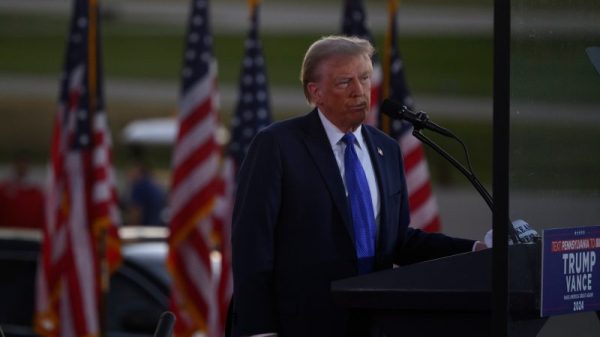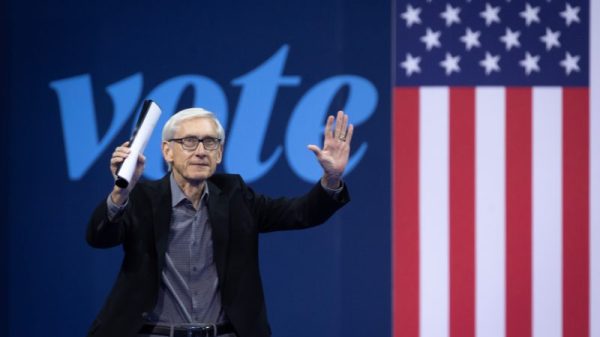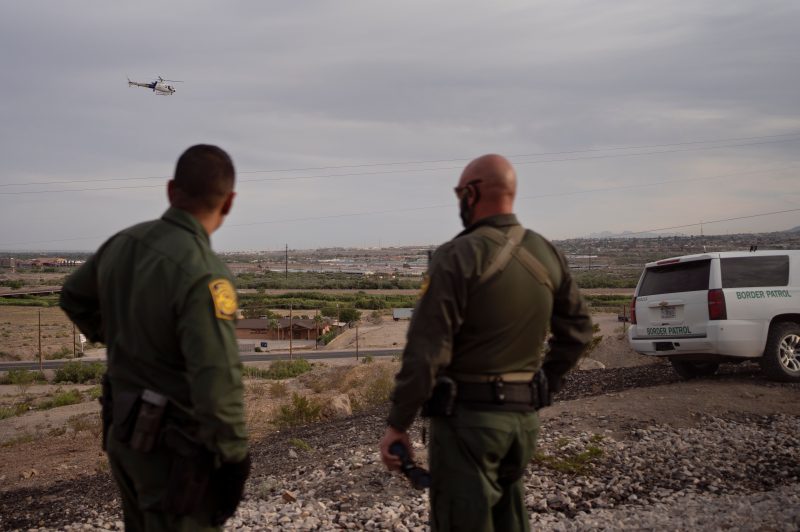No issue illustrates the breakdown of governing and politics better than immigration. A broken immigration system has broken the governing process, aided by the most cynical of politics.
Republicans recently continued what is now a decades-long streak of helping to scuttle bipartisan efforts to fix the immigration system, largely due to hard-right conservative opposition. Their opposition this time came at the request of former president Donald Trump, who again showed that he prefers the political chaos to a policy solution. He was aided by House Republicans, who favored an immigration bill that has no chance of passing in the Senate.
Republicans long have complained the loudest about the problems of illegal immigration and the need for tighter security at the U.S.-Mexico border. But they have repeatedly turned their backs on cross-party efforts to solve that and broader immigration issues, despite years of evidence that neither party alone can solve the problems and resolve competing demands and differences.
Instead of trying to work constructively on the issue in the current Congress, House Republicans have decided to try to impeach Homeland Security Secretary Alejandro Mayorkas. Their first effort collapsed Tuesday in a stunning and embarrassing setback for House Speaker Mike Johnson (R-La.).
The effect of the failure of the Senate package, however, is that while Trump and the Republicans bear the blame for sinking a package negotiated over a period of months by Republicans and Democrats in the Senate, it is President Biden who stands to be the politician who bears the brunt of public anger for the surge in migrants at the border that has taken place during his time in office.
White House officials point to Republicans as the culprits in the latest turn of events, and for good reason. But they could also look in the mirror. The president’s mishandling of problems at the border has left him politically vulnerable in this election year.
Many Democrats have been dismissive of the public mood, seeing the focus on border security as evidence of a Fox News echo chamber. For too long, they ignored the growing problem and even pleas for action from big-city Democratic mayors and blue-state Democratic governors. With the latest implosion on Capitol Hill, Biden is left holding the bag without some of the tools and funding the Senate bill would have provided.
Few issues are as complex and politically fraught as immigration policy. Immigration policy encompasses national security and humanitarian compassion. It brings together the interests of business and labor, of religious groups and advocacy organizations. It includes the legitimate claims by asylum seekers who nonetheless have overwhelmed the system; the question of how to handle those who cross illegally; and the long-standing question of what to do about the millions of undocumented immigrants now in the country, many for years or decades.
Over the past two decades, there have been repeated efforts to deal with, if not fully solve, the problems. In 2005, Sens. Edward M. Kennedy (D-Mass.) and John McCain (R-Ariz.) began the painstaking process of trying to build consensus for a comprehensive package. They had the support of President George W. Bush.
Bush favored comprehensive reform but, wary of conservative opposition, leaned in on the issue of border security, including ordering thousands of National Guard troops to the border. Finding a balance between displaying bona fides on border security and advancing legal status for undocumented immigrants has long been at the crux of the political challenge for advocates of new legislation.
Bush used his 2007 State of the Union to call for Congress to act. A few months later, a bipartisan plan emerged from a group of negotiators. Soon after that, it collapsed.
“Legal immigration is one of the top concerns of the American people, and Congress’s failure to act on it is a disappointment,” Bush said in response.
“The American people understand the status quo is unacceptable,” he continued. “A lot of us worked hard to see if we couldn’t find a common ground. It didn’t work. Congress really needs to prove to the American people that it can come together on hard issues.”
The same words could be uttered by Biden today, with one difference: There is now no expectation that Congress can come together on the issue of immigration. Too much history argues against it. Today, a changed political environment and a nativist Republican Party that cannot take yes for an answer stand in the way.
Opposition from the left and right combined to sink the measure in 2007. One casualty of the right-wing backlash was McCain’s 2008 presidential candidacy. At one point in the late spring, he joined Kennedy and other senators at a news conference. The reaction was swift and devastating — a revolt among party conservatives and, as a then-adviser to McCain recalled, “Donations tanked.” Only through McCain’s grit and determination was he eventually able to win the nomination.
The immigration issue sat for some years after that, but in 2013, another group of senators — the so-called Gang of Eight — came together to produce an 844-page bill dealing with multiple aspects of immigration.
One impetus for Republican negotiators was a post-2012 Republican National Committee-sponsored autopsy of the party’s failure to win the presidential election. Among the conclusions was the party’s need to expand its appeal to Hispanic voters.
The Senate approved the measure by a vote of 68-32 and sent it to the House. There the measure faced fierce opposition from the party’s most conservative wing. House Speaker John A. Boehner (R-Ohio) repeatedly said the measure was not dead. It died nonetheless, never coming to the floor for a vote (where it likely would have passed easily) because of conservative Republican resistance.
Another effort took place during the Trump administration in 2018, one that was focused on border security and the fate of people brought to the country as children — the Dreamers, as they became known. Senators from both parties worked to produce a measure to fund Trump’s call for a wall along the border and provide a path to citizenship for young immigrants without documentation. Trump encouraged the work. In the end, he abruptly changed his mind, and that effort too collapsed.
Meanwhile, Democrats were moving left on the issue, prodded by their progressive wing. At a presidential debate in the summer of 2019, candidates were asked to raise their hand if they thought crossing the border illegally should be a civil rather than a criminal offense. In one form or another all agreed, eager to show their dissatisfaction with the harsh immigration policies of the Trump administration.
Biden followed that path when he came into office, easing up on border policies, which has in turn led to record border crossing during his presidency. Red-state governors like Texas Gov. Greg Abbott and Florida Gov. Ron DeSantis have sent migrants north, to New York and Chicago and elsewhere. Those migrants have strained the capacity of Northern cities, led to increased crime in some places and prompted outcries for federal relief from elected Democratic officials.
The situation in New York and border politics generally have become a central issue in Tuesday’s special election in New York’s 3rd Congressional District, once held by former representative George Santos, who was expelled by his colleagues for ethics violations. Biden won the district in 2020, and each candidate is using the immigration issue against the other in what has been a close race.
As pressure has built over many months to stem the surge on the border, Biden has adjusted course, moving toward tougher enforcement. But it has not been enough to shift public opinion. Some of his lowest approval ratings are on the question of how he has handled immigration. Nor has he been willing to confront his base directly or rhetorically.
As the Senate negotiators completed their work, Biden pleaded for the authority to shut down the border, which was contained in the proposed legislation. Trump and House Republicans guaranteed that would never happen. Once again, the prospects for bipartisan legislation have died in Congress and a broken system remains in need of repair.





























